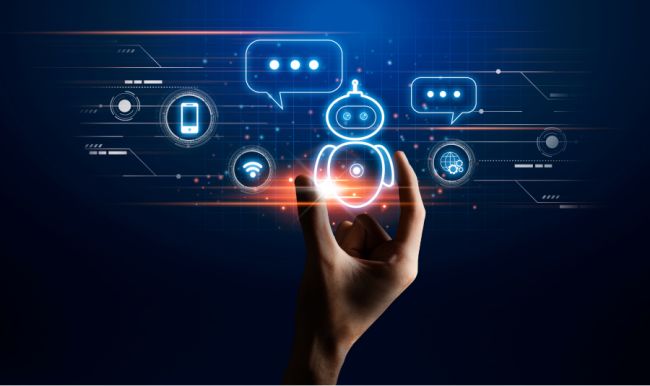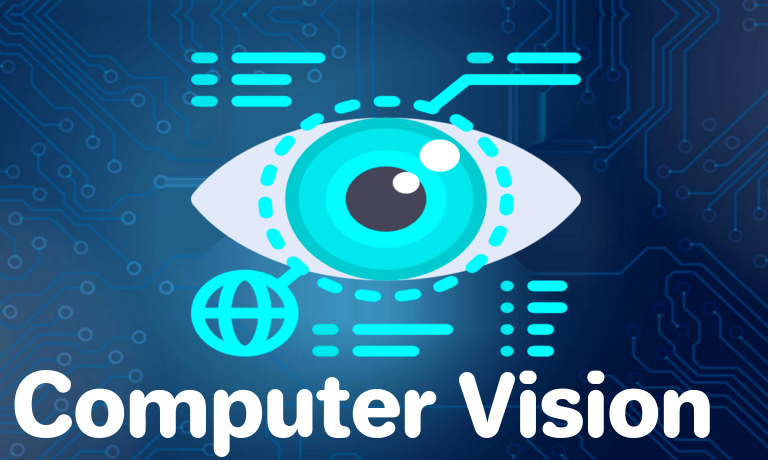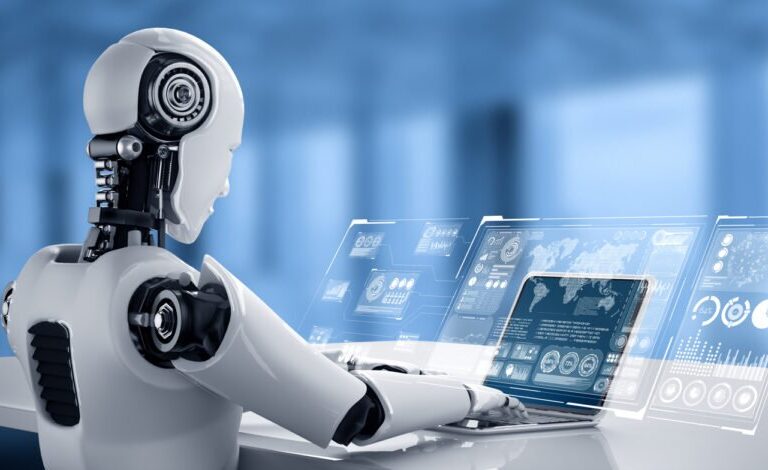
In today’s fast-paced digital landscape, integrating artificial intelligence (AI) into your business model may seem daunting. However, embracing this technology can unlock a world of opportunities, enhancing customer experiences, reducing operational costs, and increasing productivity. In 2023, an astounding 74% of global enterprises embraced or planned to embrace AI technologies. Why? Because integrating automation and intelligent systems translates into skyrocketing efficiency and astoundingly smarter work environments. As a business owner, standing out in a competitive marketplace is essential, and AI provides the edge you need to thrive. In this article, I will explore some worthwhile ways to harness AI’s power, enabling your business to grow and adapt in an ever-evolving world. Join me on this journey to discover how AI can propel your business to new heights!
Best AI Tools For Business Growth

1. AI Chatbots
Enhance customer service with AI chatbots that provide instant support and answers 24/7, ensuring customer queries are handled promptly.
To develop Custom Business Chatbots to Elevate Your Customer Experiencecheck Endevsols business solutions.
2. Data Analytics Platforms
Utilize data analytics tools to collect and analyze customer information, helping you uncover actionable insights to inform your business strategies.
3. Predictive Analytics Tools
Leverage predictive analytics to forecast shifts in customer behavior and market trends, enabling you to stay ahead of the competition.
4. CRM Solutions
Implement Customer Relationship Management (CRM) solutions to effectively manage interactions and relationships with your customers, fostering loyalty and satisfaction.
5. Marketing Automation Software
Streamline your marketing efforts by automating repetitive tasks, allowing you to focus on strategy and creativity while improving campaign effectiveness.
6. AI-Powered Virtual Assistants
Deploy virtual assistants to assist with administrative tasks, scheduling, and reminders, freeing up valuable time for business owners.
7. Inventory Management Systems
Optimize inventory management processes to ensure you maintain appropriate stock levels and reduce overhead costs, enhancing operational efficiency.
8. Fraud Detection Software
Protect your business from fraud by using AI-powered software to identify suspicious activities and prevent potential losses.
9. Language Translation Tools
Break down language barriers in international trade with language translation tools that facilitate seamless communication with global customers.
10. Supply Chain Optimization Software
Enhance your supply chain operations through optimization software that improves efficiency and reduces delays, ensuring smoother business processes.
11. Financial Analysis Platforms
Make data-driven decisions by using financial analysis tools that provide insights into your financial performance and help you identify growth opportunities.
12. AI-Powered Customer Feedback Tools
Gather and analyze customer feedback to gain insights into their preferences and experiences, allowing you to refine products and services.
13. Social Media Management Software
Boost your online presence and marketing efforts with social media management tools that streamline content scheduling, engagement, and analytics.
14. AI-Based Email Marketing Tools
Create personalized and automated email marketing campaigns that target specific customer segments, increasing engagement and conversion rates
Real-World Examples of AI in Business Across Various Industries
Artificial Intelligence (AI) is no longer just a tech trend; it’s revolutionizing various industries, from healthcare to retail. Here’s a quick dive into how AI is making an impact across different sectors.

Artificial Intelligence in Healthcare
AI is revolutionizing healthcare by enabling faster diagnoses, personalized treatment plans, and better patient outcomes. From predictive analytics to robotic surgeries, AI is enhancing precision and efficiency. AI-driven chatbots and virtual assistants also help streamline patient communication and improve administrative tasks.
Artificial Intelligence in E-commerce
AI is transforming the e-commerce industry by providing personalized shopping experiences, automating inventory management, and improving customer service with AI chatbots. Predictive algorithms analyze customer behavior to recommend products, helping businesses increase conversion rates and customer satisfaction.
Artificial Intelligence in Retail
Retailers are leveraging AI to optimize supply chains, personalize marketing campaigns, and enhance customer experiences. AI-powered recommendation engines and visual search features help customers find products faster, while predictive analytics allow stores to manage inventory more efficiently.
Artificial Intelligence in Finance
AI is disrupting the financial industry by automating trading, detecting fraud, and improving customer service through virtual assistants. AI-powered algorithms analyze large datasets for more accurate decision-making in real-time, helping financial institutions offer more personalized and secure services to their customers.
Artificial Intelligence in Real Estate
In the real estate industry, AI is used to optimize property searches, provide virtual property tours, and analyze market trends. AI-powered platforms match buyers and sellers more efficiently, making the property-buying process quicker and more intuitive.
Artificial Intelligence in Marketing
AI helps marketers analyze consumer data, predict trends, and create personalized marketing strategies. From automating email campaigns to optimizing content for SEO, AI enables companies to reach the right audience at the right time, improving engagement and conversion rates.
Artificial Intelligence in Manufacturing
In the manufacturing sector, AI is used to improve production processes, enhance quality control, and predict maintenance needs. AI-powered robots and machine learning algorithms are streamlining operations, reducing human error, and increasing productivity.
Artificial Intelligence in Logistics and Supply Chain
AI is enhancing logistics and supply chain management by optimizing routes, reducing transportation costs, and predicting demand fluctuations. AI-powered platforms analyze real-time data to improve delivery times, reduce delays, and ensure efficient warehouse operations.
Artificial Intelligence in Education
AI is revolutionizing the education industry by offering personalized learning experiences and automating administrative tasks. AI-powered tools help educators tailor lessons to individual learning styles, while virtual assistants handle repetitive tasks, allowing teachers to focus on student engagement.
Artificial Intelligence in Customer Service
AI is changing the customer service landscape by offering 24/7 support through virtual assistants and chatbots. AI-driven systems can resolve customer issues faster, provide personalized responses, and improve customer satisfaction while reducing operational costs for businesses.
Artificial Intelligence in Entertainment
AI is transforming the entertainment industry by enabling content creators to personalize recommendations and improve user experiences. Streaming platforms use AI to analyze viewing habits and recommend new content, while AI-generated music, art, and scripts are pushing the boundaries of creativity.
Artificial Intelligence in Travel and Hospitality
AI is enhancing the travel and hospitality industry by offering personalized travel recommendations, automating booking systems, and improving customer service with AI chatbots. AI also helps optimize pricing strategies and predict customer preferences, offering a seamless and personalized travel experience.
Artificial Intelligence in Agriculture
AI is reshaping agriculture with precision farming, automated irrigation systems, and predictive analytics. AI-driven drones and sensors help farmers monitor crops, predict weather patterns, and optimize water usage, improving yield and sustainability in modern farming practices.
Artificial Intelligence in Legal Services
AI is streamlining the legal industry by automating document review, conducting legal research, and offering predictive analytics on case outcomes. AI-powered platforms help law firms manage workloads more efficiently and deliver better client outcomes while reducing costs.
Artificial Intelligence in Cybersecurity
AI plays a critical role in cybersecurity by identifying threats, detecting anomalies, and automating security processes. AI-driven systems can analyze vast amounts of data in real-time to spot vulnerabilities, ensuring faster threat detection and more robust defense mechanisms.
Artificial Intelligence in Energy and Utilities
AI is transforming the energy sector by optimizing energy distribution, predicting equipment failures, and reducing operational costs. AI-powered algorithms help utility companies manage power grids more efficiently and incorporate renewable energy sources into their supply chains.
Artificial Intelligence in Insurance
AI is reshaping the insurance industry by automating claim processing, detecting fraud, and personalizing policies. Predictive analytics enable insurers to assess risk more accurately, offering customers tailored solutions while reducing administrative overhead.
Artificial Intelligence in Human Resources
AI is enhancing human resource management by automating recruitment processes, analyzing employee data, and improving talent management strategies. AI-powered tools help HR professionals identify top talent, streamline onboarding processes, and improve employee engagement and retention.
Artificial Intelligence in Automotive Industry
AI is revolutionizing the automotive industry by enabling the development of autonomous vehicles, improving safety features, and optimizing production lines. AI-powered systems can predict maintenance needs, enhance driving experiences, and improve vehicle performance, driving the future of mobility.
Artificial Intelligence in Pharmaceuticals
In the pharmaceutical industry, AI is accelerating drug discovery, optimizing clinical trials, and predicting treatment outcomes. AI-powered platforms analyze vast datasets to identify potential drug candidates, reducing the time and cost involved in bringing new drugs to market.
Artificial Intelligence in Construction
AI is transforming construction by improving project management, optimizing resources, and enhancing safety. AI-powered robots assist with tasks like bricklaying and demolition, while predictive analytics help construction companies avoid delays and manage budgets more effectively.
And that’s just the beginning. The truth is, any business can unlock new growth by integrating AI into its operations. Want to discover how AI can elevate your business? Book a free consultation with the experts at Endevsols and let’s explore the possibilities together!
FAQs
1. What is the role of AI in business development?
AI plays a crucial role in business development by automating processes, enhancing customer experiences, and providing valuable insights through data analysis. It helps businesses make informed decisions, streamline operations, and stay competitive in the market.
2. How can AI improve customer service?
AI improves customer service through tools like chatbots and virtual assistants that provide instant support and 24/7 availability. These systems can quickly answer customer queries, resolve issues, and enhance overall customer satisfaction.
3. What are the best AI tools for business growth?
Some of the best AI tools for business growth include:
- AI chatbots for customer support
- Data analytics platforms for insights
- Predictive analytics tools for forecasting
- CRM solutions for managing customer relationships
- Marketing automation software for streamlined campaigns
- AI-powered virtual assistants for administrative tasks
4. How can businesses use data analytics platforms?
Businesses can use data analytics platforms to collect and analyze customer data, uncovering actionable insights that inform marketing strategies, product development, and customer engagement efforts.
5. What industries benefit from AI integration?
AI integration benefits numerous industries, including healthcare, e-commerce, retail, finance, real estate, manufacturing, logistics, education, customer service, travel and hospitality, agriculture, legal services, cybersecurity, and more.
6. How does AI contribute to better decision-making in finance?
AI contributes to better decision-making in finance by analyzing large datasets in real-time to detect fraud, automate trading, and offer personalized financial services, thus improving accuracy and efficiency.
7. What are predictive analytics tools, and how do they work?
Predictive analytics tools use historical data and statistical algorithms to forecast future trends and behaviors, enabling businesses to anticipate customer needs and make data-driven decisions.
8. Can AI help in reducing operational costs?
Yes, AI can help reduce operational costs by automating repetitive tasks, optimizing supply chain management, and enhancing inventory control, allowing businesses to operate more efficiently.
9. How does AI enhance marketing efforts?
AI enhances marketing efforts by analyzing consumer data to predict trends, personalizing campaigns, automating email marketing, and optimizing content for better engagement and conversion rates.
10. What should businesses consider before implementing AI solutions?
Before implementing AI solutions, businesses should consider their specific needs, the potential return on investment, the integration process with existing systems, employee training requirements, and ongoing support and maintenance.
11. How can I get started with AI for my business?
To get started with AI for your business, assess your needs, explore AI tools relevant to your industry, consider consulting with AI experts, and begin with pilot projects to evaluate the effectiveness of the technology.
12. Where can I find expert consultation for integrating AI into my business?
You can book a free consultation with experts at Endevsols, who can help you explore the possibilities of integrating AI into your business operations.






